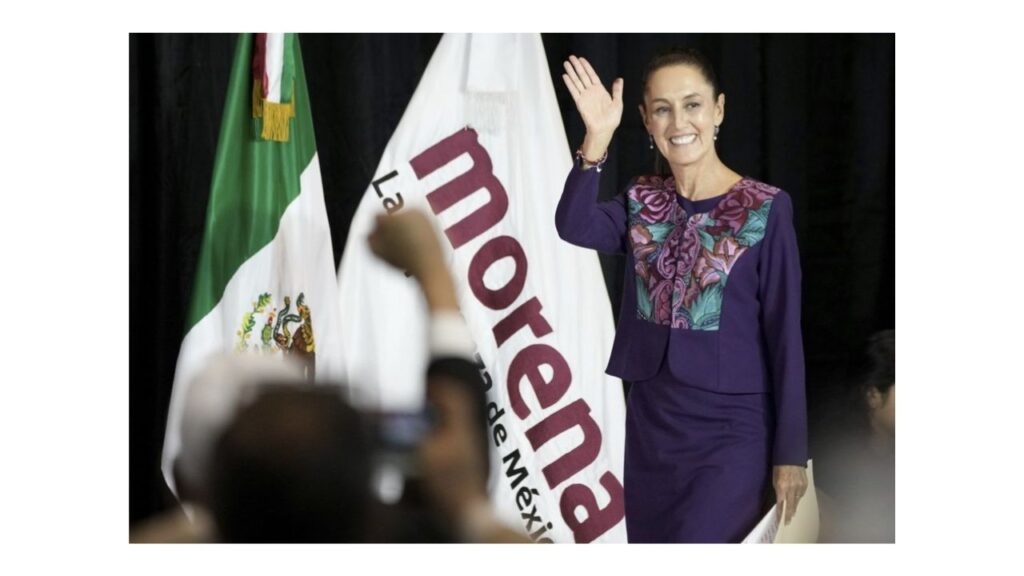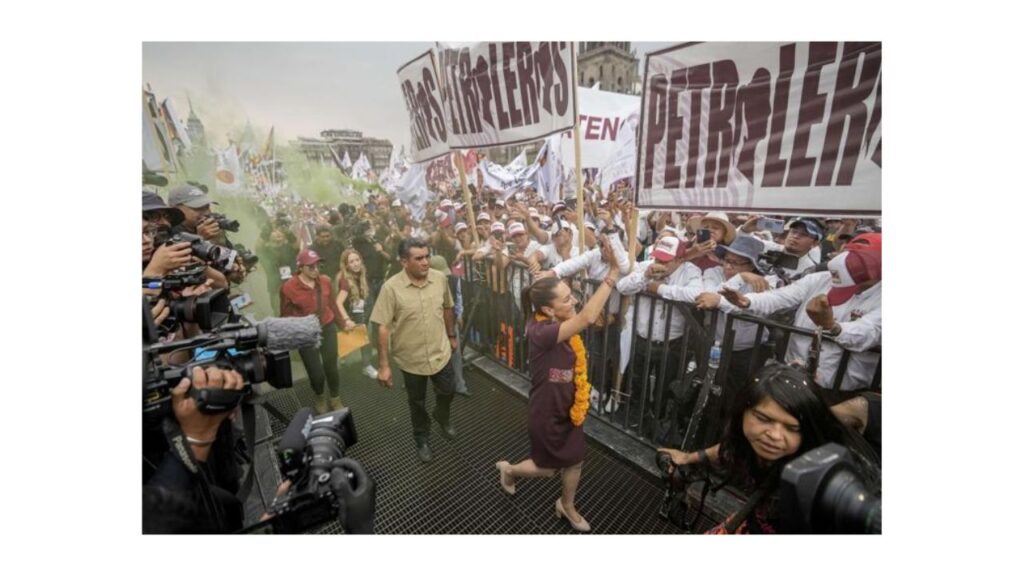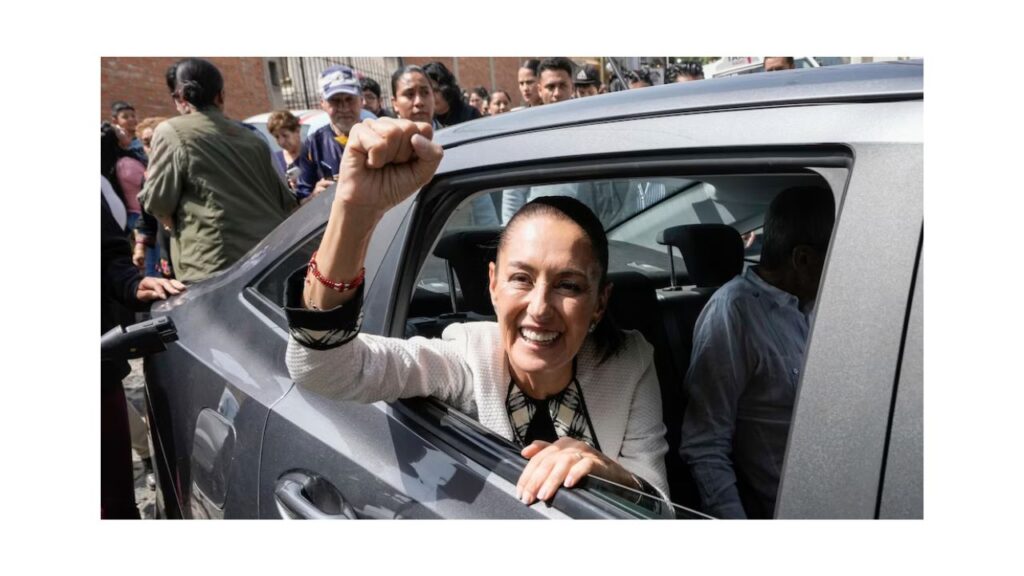Climate scientist Claudia Sheinbaum appears to have an unstoppable lead in the contest to become Mexico’s first female president, according to an official rapid count.
In historic elections on Sunday, Mexicans cast ballots on issues of gender, democracy, and populism as they drew a future for their nation under the shadow of cartel violence.
Mexico will probably elect its first female president with two women dominating the race, which would be a significant development in a nation long known for its macho culture. Additionally, this election is the largest in the history of the nation. The National Electoral Institute reports that there are over 20,000 local and congressional seats up for grabs.
In public polls, Claudia Sheinbaum, the former mayor of Mexico City, has led by a comfortable margin for several months. The coalition of parties led by opposition senator and software entrepreneur Xóchitl Gálvez has little in common historically aside from their current opposition to outgoing President Andrés Manuel López Obrador.
Mexico is bitterly divided ahead of this Sunday’s election: drug cartels have left the nation divided into a patchwork quilt of rival fiefdoms, and friends and family no longer discuss politics for fear of widening already deep divisions. With a wave of unprecedented heat, drought, pollution, and political violence, the environment is literally heating up.
Currently:
—Greater populist measures or a more vigorous cartel war? Mexicans consider options before selecting a new leader.
— It looks like gangs and drug cartels in Mexico will have a bigger say in Sunday’s elections than they did previously.
— Mexicans make a decision in an election marred by violence between continuity and change.
— The final day of the election campaign in Mexico is marred by violence.
The latest on Mexico’s election is as follows:
According to an official quick count, climate scientist Claudia Sheinbaum had an unstoppable lead on Sunday in the contest to become Mexico’s first female president.
Sheinbaum received between 58.3% and 60.7% of the vote, based to a statistical sample, according to the head of the National Electoral Institute. Xóchitl Gálvez, the opposition candidate, received between 26.6% and 28.6% of the vote, while Jorge Álvarez Máynez received between 9.9% and 10.8%.
The candidate for the governing party ran on a platform of carrying on President Andrés Manuel López Obrador’s political trajectory, which has been established over the previous six years.
Despite a fierce challenge from Gálvez, Sheinbaum, the 61-year-old who was tipped to win, won the election handily. The two primary opponents in Mexico were women for the first time.

Following Sunday’s presidential election, former Mexico City mayor Claudia Sheinbaum is ahead in very early results; however, Mexico’s electoral body has only counted 10% of polling location tallies.
Voter turnout is not as fast as it usually is.
In order to announce results, political parties, candidates, and the news media are being urged by the president of Mexico’s electoral agency “to act with restraint, prudence and responsibility.”
The appeal was made on Sunday night after some news outlets declared the presidential contest based primarily on unofficial, private exit surveys.
“Our electoral system is designed to ensure that every vote counts and that every result is verified in a fair and transparent manner,” says Guadalupe Taddei Zavala, president of the electoral institution, in a statement.
The historic election in Mexico is not yet complete. The Associated Press bases its report on official results, even if private exit polls favor front-runner Claudia Sheinbaum.
The results of Mexico’s historic election, in which a woman is probably going to be elected president for the first time, are starting to be released by the electoral body.
In 32 states in Mexico, polls are closed. The outcome of an election that will determine the course of events in the upcoming years is anticipated by voters. There will be one more hour of voting on the Baja California peninsula.
MCALLEN, Texas — Voters from Mexico gathered in large lines at the consulates closest to them. In numerous American cities as well as other nations, the turnout surpassed Mexico’s projections.
The Dallas Morning News reports that some voters in Dallas began to queue at 3:30 a.m. local time.
After hundreds crowded the sidewalks to wait for hours in the sweltering heat with little to no shade, similar lines were visible in Houston.
According to the Los Angeles Times, voters in Los Angeles covered themselves with Mexican flags and cheered each time a new ballot was cast. In order to satisfy the hungry voters, street vendors gathered outside the embassy to offer food and refreshments.
There were lengthy lineups of hundreds of voters at the Mexican consulates on Sunday in San Francisco, San Diego, and Fresno. Over three million Mexican immigrants live in California.
Mexico’s National Electoral Institute released a statement saying, “In certain cases, such as in Madrid, California, Chicago, and Phoenix, the large influx of people wishing to vote at the consular headquarters has exceeded expectations.”
MEXICO CITY Three individuals were hurt in an armed attack close to a polling place in the border city of Tijuana, according to Baja California security officials.
According to local media, a businessman who was waiting in line to cast his vote was attacked by a suspected criminal, which resulted in a violent incident. There was a shootout after the assailant was shot by his bodyguard.
Two suspected thieves stole ballots from three polling places in the seaside city of Ensenada, which is located in the state of Baja California. This violent incident also happened there. As the attackers ran, the cops caught up with them. The state Secretariat of Citizen Security said that after a chase, one of the attackers was killed in an accident.
MEXICO CITY According to the Chiapas Prosecutor’s Office, one guy was abducted by armed men as he was casting his ballot at a polling place in the town of San Fernando, in the state of Chiapas, which is in southern Mexico.
The victim was abducted by two armed men who broke into a nearby market that had a voting booth set up. Prosecutors claimed that the man later turned up beaten in another location.
Chiapas has had a more rapid increase in violence than any other region in Mexico during the past year. Along the country’s southern border with Guatemala, cartels and other criminal organizations have fought a bloody fight for control of the lucrative migrant and drug smuggling routes.
MEXICO CITY At most of Mexico’s over 170,000 polling locations, voting was orderly although laborious; yet, there have been a few documented cases of violence. Four armed attackers attempted to storm into a classroom in the central state of Puebla where voting booths were set up in an attempt to grab votes. According to state police, there have been arrests in this case.
The governor of Querétaro, a state located in central Mexico, just north of the city, also informed the local media that there had been attempts to burn votes at four voting locations in his state. Social media users shared a video of two masked men riding away on a motorcycle following an incident. However, the logistical and conflict-related issues were arguably most severe in Chiapas, a state bordering the south, where as many as 42% of polling places were delayed in setting up; some apparently couldn’t open at all.
MEXICO CITY After more than an hour and a half of waiting in Mexico City, presidential candidate Xóchitl Gálvez cast her ballot. She said, “It is the people who have to decide, I have already done my job… let the citizens do their job,” as she smiled for photographers after casting her ballot. She said she expected a “huge turnout” and that the election results would probably “come a little late.”
MEXICO CITY It seems that some voters, particularly those who were inclined toward the opposition, had Mexico’s relentless wave of crime and violence at the forefront of their minds.
Considering that there haven’t been as many drug cartel shootouts in the capital as in the states that surround it, voters in Mexico City were more concerned about low-level violence.
34-year-old office worker Julio García declared he was supporting the opposition. Garcia claimed, “I’ve been robbed twice, with a pistol pointed at me,” referring to armed attackers who approached his car while it was stopped in traffic.
“We very certainly require a new leadership team. We will turn into Venezuela if we keep going in the same direction.
Diego García, a 49-year-old merchant who is unrelated to Julio, declared his intention to vote against the party. The primary reason for the need for reform is the increase in crime. My relatives have experienced kidnapping and robbery.
MEXICO CITYIn the election in Mexico, carrying your dog to the polls is a relatively new trend.
Nearly a dozen dogs, ranging in size from Great Danes to pugs, were calmly waiting with their owners in lines that wrapped around the block at one polling location in central Mexico City.
Koba, a tawny-colored Husky, went to the polling site with his owner, Marco Delaye, and came out grinning.
Delaye remarked, “He behaved very well.” “He had no trouble letting me cast my ballot.”
That was no small accomplishment, considering that polling stations were packed and attendance was extremely high early on Sunday—possibly due to Mexicans queuing up to cast their ballots ahead of time in order to avoid the nation’s historic heat wave.
MEXICO CITY Front-runner Claudia Sheinbaum told reporters briefly as she left her house to cast her ballot, describing the day as “historic” and “very happy, very excited.”
She claimed to have had a “quiet” evening and that she would have breakfast at home after casting her ballot.
She made an announcement for everyone to vote. The former mayor of Mexico City declared, “You have to go out and vote. You have to do your part.”
MEXICO CITY Election authorities pushed their way past 34-year-old homemaker Stephania Navarrete as she watched scores of cameramen and election officials assemble where front-runner Claudia Sheinbaum was scheduled to cast her ballot in the San Andres Totoltepec neighborhood on the outskirts of Mexico City.
Despite her personal reservations about departing President Andrés Manuel López Obrador and his party, Navarrete declared that she will cast her vote for Sheinbaum.
For me as a Mexican woman, having a female president will be similar to the past, when you were restricted to a certain career only by virtue of your gender. Not any longer.

Sheinbaum’s mentor’s social programs, she said, were important, but her main concern in this election was the rise in cartel violence over the last five years.
They need to give that greater attention, she stated. For me, the main obstacle is security. They said they would reduce crime, but in reality, crime rates rose sharply. While I don’t hold the president solely responsible, he does bear some of the burden.
Men and women are waiting for the polls to open at a special voting location on a sizable medical campus in Mexico City. This is where people, such as on-duty doctors and nurses, who are unable to return home to cast their ballots, can do so.
“I told my colleagues to go vote yesterday. I don’t know who they are going to vote for, but it’s the first time they will be able to elect a woman, who I think is going to play an important role,” stated Aida Fabiola Valencia. The fact that women make up 60% of the population is historic.
Although there have been female candidates in Mexico in the past, Claudia Sheinbaum and Xóchitl Gálvez, the front-runners, are female for the first time.
“The fact that people vote for a woman implies a lot of change at all social and work levels, that means that it is already starting to get better,” remarked Mónica Martínez, a neighbor. It’s there already. However, it is far more important that it is for a presidential candidate.
MEXICO CITY In an effort to avoid double voting, thousands of Mexican retailers are advertising free merchandise to patrons who visit on Sunday and wear ink on their finger.
The goal of the offers is to promote voting.
Voters can get a complimentary cup of coffee at select locations of Oxxo, the biggest convenience store brand in the country. According to the National Restaurant Chamber, certain members will also be providing food and beverage discounts.
MEXICO CITY The National Human Rights Commission of Mexico, which was formerly independent, released an odd statement condemning election officials.
The commission, which has mainly backed and adhered to the policies of departing President Andrés Manuel López Obrador, asserted on Saturday that electoral authorities have not taken strong enough action against “slander,” a term that López Obrador regularly uses to denounce any form of criticism.
The commission is not expected to be involved in the election process, which is overseen by the independent National Electoral Institute in Mexico.
